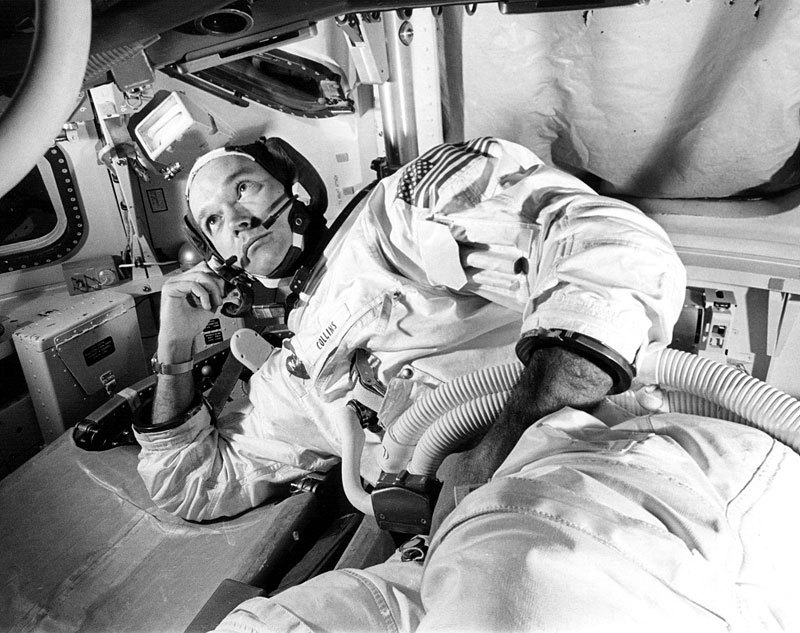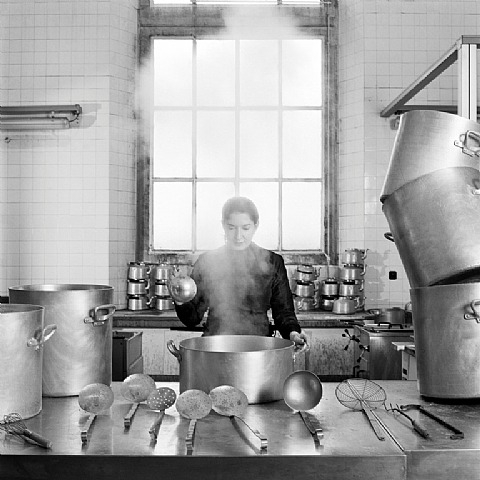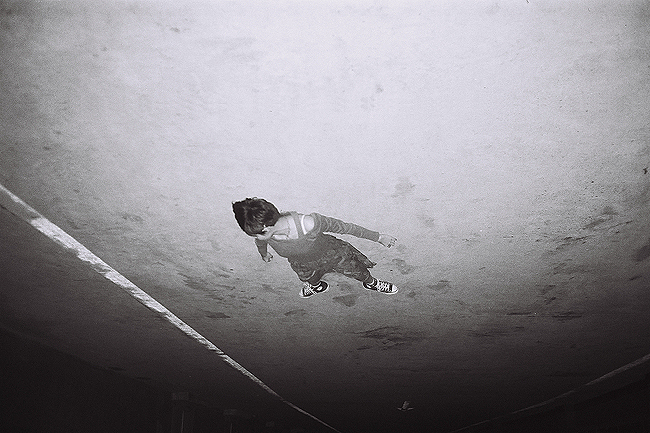In an admittedly half-hearted attempt to begin making adult decisions, I thought I would go back to school to get a degree so I could, in that curious English term, “make a living.” Soon I was surrounded by art students young enough to be my children, taking theory classes in the hot new field of “affect.”
Michael
Every night Michael Collins comes to whisper in my ear. Collins was the third man, the Apollo 11 astronaut who travelled all the way to the moon but didn’t get to walk the walk. Call him: the loneliest man in space. His loneliness gives me a dry feeling in the back of my mouth, even as he natters on about doing laundry in zero gravity. “It’s not the tumble dry cycle,” he insists, “it’s the ironing. You can’t get the wrinkles out.” The sad truth is that even though he’s been dead for years now, he really doesn’t have anything to say, just like most of us I guess.
Marina
I’ve decided to model my apartment after performance artist superstar Marina Abramovic. Like her I have a studio, office, body conditioning space and kitchen, but because of my paycheck, these all exist in the same room. What was irresistible to me was not the architecture itself, which I’ve never visited, but its description. I always prefer descriptions to experience, it’s so much less messier, don’t you find? When Marina converts the brick and mortar of her house into words they appear like manifestos written in bold type. The words are so certain, so sure of themselves, everything can be named and known, everything has its place. And on the far side of this certainty is her practice. “I often sit with a piece of white paper in front of me and spend a long time not making work.”[1] In other words: making means not making, and the practice of surprise. What could the practice of surprise look like? I have no idea. But just as I once longed to wear all of Elton John’s 2000 pairs of eyeglasses at the same time, I now hoped to live in the artist’s house and practice surprise. Is it too strange to speak of a house throwing its voice – its spaciousness, its moods? I wanted to live in the affective atmosphere of her house (admittedly shrunk to a single room) with its heady mixture of control and submission, sensory diet and imaginary extravagance.
Parents
The voice of Michael Collins and the house of Marina Abramovic. It seems I had acquired a new set of parents. All the better to help me on my new quest: to enter the world of what a bevy of writers were calling affect. Where to begin? Like any respected theorist I would use other people’s ideas to describe my experience. But first, an attempt at definition. What is affect? Most insist that it is a verb, not a noun.[2] It is a movement, and it’s always relational. It’s between me and you, or it’s between you and the chair you’re sitting on, or the painting that stares back at you until you start to cry. There is the uncanny sense that behind the cover stories, the incessant chit chat we use as the preferred interface for adults, that other modes of communication are at work, there are invisible wires connecting us to everything in the room, and in every other room.
Simon O’Sullivan is convinced that affect floats past in a moment, while Teresa Brennan writes about affect as atmosphere, “the physiological shift accompanying a judgment.”[3] Is it always there, or fleeting and momentary?
Science
How could I follow these questions and live Marina’s practice of surprise? If affect lived in the flow between bodies, I would have to put my body um where my mouth is, and feel it for myself. And following Michael Collin’s lead I would have to go back to when we first met, when I was a kid of eight or nine, watching the moon landing of Apollo 11. I would have myself hypnotized, I would throw myself into the hands of the pseudo-scientists, into the unconscious, and explore the affect of déjà vu. Like Michael Collins, I wanted to make a long trip to see what might be waiting on the other side.
Hypnotist
The appointment is easily made and on the appointed day I make my way to a nondescript house in the Annex. I wait in the waiting room after signing the usual forms, and at last am ushered in for the audience. The good doctor (but why not the automatic appendage of good to other vocations: the good activist, the good plumber, the good professor) is not yet here. The empty room announces: I’m a busy guy! Henry (“Call me Henry”) arrives in a flurry of apologies, his Air Jordans boosting an already considerable frame to new heights. He exudes the easy confidence of a man who has never had a second thought, whose every pronouncement seems an affirmation of progress. He’s giving me the spiel, the hypnotism spritz and I zone out of the content immediately, all I’m catching is the easy breeze of his confidence. And it’s not until I can lean back into this borrowed confidence, his affect temporarily mine, that I can touch the doubt I can feel radiating in small circles from my hip bones. I can feel my chest constrict, my jaw tighten, my hands involuntarily clench. I am getting smaller and smaller – anxiety is the pill you take to make you small – and then I can feel my borrowed super powers, the confidence of the good doctor, smoothing all the anxiety away, and my muscles relax as I return to normal size.
I take a moment to flick my gaze over the doctor’s excellent suit. It’s a form-fitting, Paul Smith ensemble bristling with tags that announce: Paul Smith. Paul Smith. Paul Smith. As if some absent-minded seamstress was concerned the name would slip away without repetition. Is it the studied casualness of the upturned shirt collar that marks him as a dandy? Baudelaire writes, “Dandyism, which is an institution outside the law, has a rigorous code of laws that all its subjects are strictly bound by…” [4] Outside the law, there is another law, even more rigorous than the usual ones. Perhaps embracing this new armour is the only freedom left for these sheriffs of “controlled energy” whose “habit of command” is a “calmness revealing strength.” [5] The dandy adheres to the law so that he can be watched over by others, forbidden to lend his sartorial grace to any affect except restraint, anger, or the looping sadness that comes with an inability to mourn.
Doctor Henry asks me to concentrate on his eyes and begins counting down slowly from ten to one. Every time he says a number it is answered by a voice inside my head that says, “It’s not going to work.” “Nine.” “It’s not going to work.” “Eight.” It’s not going to work.” But as soon as he says, “One,” a rigidity takes over my body. I am paralyzed in the chair, I am the chair. And still his voice is calling me, “You are ten years old, lying in bed on North Shore Boulevard. A faint breeze arrives from the open window.” And then I am no longer hearing his words, I am there again, feeling the flannel rub of pajamas against my elbows as I move them from one side of the bed to the other. I am somewhere between asleep and awake when the sliver of light that runs across the bottom of the bedroom door suddenly widens and a figure appears in the doorway. I can see without seeing it’s my mother and close my eyes immediately. My heart pounds and I fold my body in on itself. I want to see what my brother is doing on the other side of the room, I want to communicate with him, but I don’t know how. I know what I’m supposed to do because I’ve been trained to see myself, like Baudelaire’s dandy, through the eyes of someone else. I learned how to act by becoming an actor, and if I wasn’t able to secure the lead role in my life, that was only because it was occupied before I was conceived. I pretend to sleep and then I pretend to partially wake up. I look over at my brother and try to pass the cues over to him, but it’s hard without words. He has a startled look on his face, the soft features a mask of fear because he can tell from my leaning, crouching, tight expressions that there’s something he’s supposed to know, but he doesn’t know what it is. So he lets it pass.
My brother, his name is Johnson, like the old president (though it should really be Doormat, or Kick Me, to make things perfectly clear), stumbles out into the living room. This is the living room, the rest of the house is the dying room. My father is there and I nearly jump out of the chair I have become as he turns to me, or at least, in the general direction of me. This is my dad without the haze of Alzheimer’s and too much daytime television. This is the father who still has a brain to lose. I have separated myself from Doormat, from my brother, because I’m worried he’s going to get us into trouble, I’m not sure what we’re doing out here yet, I can’t tell whether my mother is angry or excited or both. Are we going to be punished again for not being sleepy enough or not being awake enough? The worst thing is to show fear, once they catch the smell they begin to feed off it. The affect is containment and denial via feigned sleepiness.
There is a live wire running through everybody here, as if a clumsy electrician had run a current between family members. I can feel their blood inside my blood, I can feel the chromosomes dividing. The feeling of being so close to these bodies is so overwhelming there are moments I can hardly feel anything at all. And then the anxiety pours back in, like radio static flowing through the veins. Teresa Brennan writes that affect is an atmosphere. “The transmission of affect, whether it is grief, anxiety, or anger, is social or psychological in origin.” [6] Check. “But the transmission is also responsible for bodily changes.” [7] Double check. In fact my not-quite-ten-year-old self is a knot of anticipation and fear and excitement and then feelings too knotted and complicated to name. But it’s obvious beyond mention that my feelings are not entirely my feelings. There is an orange ball of fear that keeps jumping out of my mother’s forehead, like a bindi, and underneath that a deep horizon of oil slick, black on black, which is where she keeps all the bodies from the Indonesian internment camps during the Second World War. When the Japanese came and invaded her little island universe, they took everything away, and they’ve never stopped taking it away. The bodies she saw, the corpses lying in piles at the side of the road, never stopped bleeding. Not for one day. The invasion never ended, I know, because I have it right here, stored deep in my body, and it is more real to me in this moment, in this living room, than anything I have ever experienced. My deepest memories are not my memories. It’s not that unusual actually. But the way these memories are transmitted — could we call it my inheritance? – is something we might name as affect. What I’ve come here to explore is whether this inheritance is persistent, like eye colour or a disposition for cancer, or if instead it’s fleeting and momentary.
Let’s return to the scene, shall we? But we’ll rename the characters. So there is Doormat, that’s my brother. There’s God, that’s my mother, and my dad the Holy Ghost. I’m Shithead. Doormat says, “I wish I could be an astronaut,” because he wants to fit in, but the more he licks God’s ass, the more likely his will get kicked. The Holy Ghost says, “You’ll have to wait until after your birthday,” and everybody laughs because the atmosphere is so tight we could do jumping jacks off it. I look down at my hand which is clenched up into a ball and tell it to relax, but my fingers can’t speak the language. It seems the affect of a vast and unnameable fear has been successfully transmitted. It has jumped from human to human, blood to blood.
If I were to take a photograph of this moment we might appear just like a family, but only because cameras aren’t yet sensitive enough to show affect. In the future, the banal details will be omitted, and these scenes will show only affect, every instant that is not fear or trembling excitement will be scrubbed away so that we can enter the past more faithfully. God looks at Doormat who as usual is looking in the wrong direction, meaning, not at God. I follow God’s look to the hazy black and white screen as a figure climbs down a ladder in a very fine looking suit that I would like to wear for the rest of my life and there is a white noise crackle coming out of the speakers, as if we were jacked in to his cerebral cortex. Actually I don’t think “cerebral cortex,” I think: I can hear what he’s hearing. Houston Control is in my head. And this suit is designed, like the suit of the dandy, to ensure that the one wearing it doesn’t feel anything at all. It carries the atmosphere of Houston, a pervasive, omnipresent state that allows me to live. I can live in this moon of a living room, so long as I don’t feel anything, and my lines are already scripted. “One small step for shithead, one giant leap,” etc. Even the hahaha I hear Neil Armstrong pour into the white noise the next day sounds like he’s reading it off the giant teleprompter in the sky. He’s been watched by Houston so long he’s absorbed the look, he’s absorbed the atmosphere, the feeling tone, of being watched. The affect of external surveillance has become internal surveillance. Where do my feelings stop, and the emotions of my space suit begin?
Of course, when I see him I am seeing myself, I am bringing the affect of my years with God, Doormat and the Holy Ghost and looking through them, like looking through a keyhole. The moon has an atmosphere that is unlivable by human standards, but more elegant and less destructive forms of life can flourish. The astronauts depart, but not before leaving behind 36,000 pounds of garbage. [8] Thanks for the memories. It’s hard for me not to become every picture I look at and every book I read. This former self, newly available via the time travel that is hypnosis, is becoming a ghost. Doormat wants to go to sleep and the Holy Ghost is eating walnuts, which he’s told us will expand in our stomachs and burst like hand grenades, which is his friendly way of saying: keep your little fucking hands off my nuts. I am worried that he will burst because he eats them compulsively, sometimes without even bothering to chew. Is this what he spends his time at night doing? Is he kind of working, is he employed in some kind of walnut eating job? It looks like he’s working, and that makes me worried that I’m not working, only unlike God, he doesn’t live inside me. He lives outside the perimeter, outside the Zone, where the doyennes of affect cannot touch him.
Let us rush to judgment, or at least a conclusion. Is affect moment by moment or a steady persistent atmosphere? Sylvan S. Tompkins writes that “our affects…are continually responding to the affect of the other.” [9] Here the keywords are “continually responding,” but then later he writes, “Affect is momentary; in general, it is of short duration.” [10] My déjà vu arrives moment by moment, but while the affect is shifting throughout, the intensities of attraction, anxiety and fear rising and falling, they are always at play. Why might Tompkins insist on this fleeting apparition, this passing stranger of an affect cloud? Later in the same paper he lays down a schtick he calls “information advantage,” which means that you can take a small bit of experience, like the look on a face, and extract a whole bunch of information out of it. You can always tell a book by its cover. The point is to feel as little as possible, and to create large theory mountains out of it. Not feeling anything is what this author describes as “information advantage.” Perhaps like all theories, this one is essentially defensive. “Science is not magical, but it does involve two conjoint things going on at the same time: tremendous compression of information which is capable of extraordinary expansion. We call that expansion explanation or prediction or control.” [11]And there you have it, we’ve come home. Why study affect at all? Why, in order to predict it, or control it. Or at the very least contain it. We will turn our feelings into a system, develop a method of study, even a science.
Somewhere God is smiling, the Holy Ghost is nodding and Doormat is saying yes. Shithead says: Houston, I’m coming home.
Footnotes
1. The House/My Body by Marina Abramovic, Galeries Magazine No. 62, Summer 1995. pg. 74.
2. Though Deleuze and Guattari suggest that affect can be stockpiled as potential blocks of sensation. Even these anti-God theory thugs sometimes turn processes into things, in brave new forms of theology.
3. The Transmission of Affect by Teresa Brennan, Ithaca and London: Cornell University Press, 2004. pg. 5.
4. The Painter of Modern Life by Charles Baudelaire p. 419.
5. The Painter of Modern Life by Charles Baudelaire p. 420.
6. The Transmission of Affect by Teresa Brennan, Ithaca and London: Cornell University Press, 2004, pg. 1.
7. The Transmission of Affect by Teresa Brennan, Ithaca and London: Cornell University Press, 2004. pg. 1.
8. Harper’s Magazine, April 2013, Vol. 326, No. 1955, pg. 15.
9. Inverse archaeology: Facial affect and the interfaces of scripts within and between persons” by Sylvan S. Tompkins, in Exploring Affect: The Selected Writings of Sylvan S. Tomkins, ed. E. Virginia Demos, Cambridge: Cambridge University Press, 1995. pg. 285.
10. Inverse archaeology: Facial affect and the interfaces of scripts within and between persons” by Sylvan S. Tompkins, in Exploring Affect: The Selected Writings of Sylvan S. Tomkins, ed. E. Virginia Demos, Cambridge: Cambridge University Press, 1995. pg. 289.
11. Inverse archaeology: Facial affect and the interfaces of scripts within and between persons” by Sylvan S. Tompkins, in Exploring Affect: The Selected Writings of Sylvan S. Tomkins, ed. E. Virginia Demos, Cambridge: Cambridge University Press, 1995. pg. 288.






